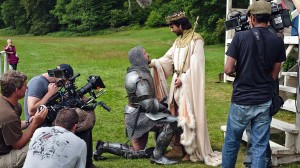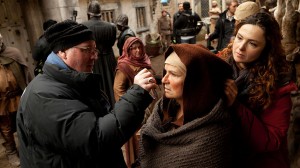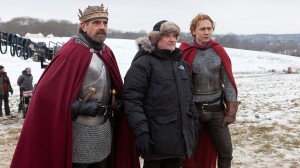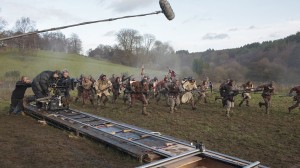 Whenever an actor best known for film or TV work is cast to perform in Shakespeare there’s always a debate about whether celebrity casting is a good or a bad thing. Should, in particular, theatres, employ celebrities in an obvious attempt to boost audience numbers, or should they stick to trying to build the careers of more serious but less glamorous stars. It’s a tricky argument which has swung both ways. James McAvoy’s Macbeth is a case in point: I haven’t seen it, but it’s a valid production and McAvoy is a good actor as well as a good-looking one. At the time of David Tennant’s performance of Hamlet Jonathan Miller suggested he had only been given the role because he was currently playing Dr Who on TV, whereas he had been playing increasingly important Shakespeare roles at the RSC since 1996. And Tennant, as anyone who saw his Hamlet will remember, has the rare gift of being able to command a stage to give a memorable performance as well as handling the complexities of Shakespeare’s verse.
Whenever an actor best known for film or TV work is cast to perform in Shakespeare there’s always a debate about whether celebrity casting is a good or a bad thing. Should, in particular, theatres, employ celebrities in an obvious attempt to boost audience numbers, or should they stick to trying to build the careers of more serious but less glamorous stars. It’s a tricky argument which has swung both ways. James McAvoy’s Macbeth is a case in point: I haven’t seen it, but it’s a valid production and McAvoy is a good actor as well as a good-looking one. At the time of David Tennant’s performance of Hamlet Jonathan Miller suggested he had only been given the role because he was currently playing Dr Who on TV, whereas he had been playing increasingly important Shakespeare roles at the RSC since 1996. And Tennant, as anyone who saw his Hamlet will remember, has the rare gift of being able to command a stage to give a memorable performance as well as handling the complexities of Shakespeare’s verse.
 It’s perhaps less of an issue with Shakespeare on TV. Using well-known TV actors broadens their range and the programmes pick up a wide range of viewers from Shakespeare-lovers to those who are turning on just to see their favourite actors. And so it was last year with The Hollow Crown. The decision was made to lead each of the four plays with young actors with a substantial TV and film fanbase, Ben Whishaw and Tom Hiddleston. They were surrounded by other fine actors who are also well known to TV audiences: David Suchet, Patrick Stewart, Julie Walters, Jeremy Irons. On Twitter it was interesting to see how many people tuning in for the stars were surprised to find actors such as David Suchet, universally known for his portrayal of the Belgian detective Hercule Poirot, obviously at home in Shakespeare. Many older theatregoers will remember all of the above performed on stage, often in Shakespeare, before they were famous.
It’s perhaps less of an issue with Shakespeare on TV. Using well-known TV actors broadens their range and the programmes pick up a wide range of viewers from Shakespeare-lovers to those who are turning on just to see their favourite actors. And so it was last year with The Hollow Crown. The decision was made to lead each of the four plays with young actors with a substantial TV and film fanbase, Ben Whishaw and Tom Hiddleston. They were surrounded by other fine actors who are also well known to TV audiences: David Suchet, Patrick Stewart, Julie Walters, Jeremy Irons. On Twitter it was interesting to see how many people tuning in for the stars were surprised to find actors such as David Suchet, universally known for his portrayal of the Belgian detective Hercule Poirot, obviously at home in Shakespeare. Many older theatregoers will remember all of the above performed on stage, often in Shakespeare, before they were famous.
 It’s actually the same for Messrs Whishaw and Hiddleston. Ben Whishaw made his name playing Hamlet in 2004, and Hiddleston was tipped for stardom while performing in Cheek by Jowl’s production of Cymbeline in 2007. Most actors work in a variety of media, though Simon Russell Beale who played Falstaff in The Hollow Crown is still the darling of theatregoers.
It’s actually the same for Messrs Whishaw and Hiddleston. Ben Whishaw made his name playing Hamlet in 2004, and Hiddleston was tipped for stardom while performing in Cheek by Jowl’s production of Cymbeline in 2007. Most actors work in a variety of media, though Simon Russell Beale who played Falstaff in The Hollow Crown is still the darling of theatregoers.
The Hollow Crown did not please everybody: heavily cut, sometimes eccentrically shot, but it’s been extraordinarily successful in bringing Shakespeare’s history plays to a popular audience. I take an interest in how Shakespeare is represented in social media such as Twitter and Facebook, and have been intrigued by the activities of the Twitter fan group for the series @HollowCrownFans , sharing news, information, comments, clips and a refreshing enthusiasm. Sundays are #ShakespeareSunday when followers can post quotations from Shakespeare, sometimes themed. I’ve been finding these really interesting: instead of concentrating solely on the series, quotations from plays throughout the canon, often quite obscure, are posted. Clips from other recordings of Shakespeare’s plays, such as Laurence Olivier’s Henry V, appear. Clearly many are fans of Tom Hiddleston, but at least some of them are also getting the Shakespeare and finding it says something to them. And since when has the actor playing Henry V not been the pin-up of at least part of the audience?
It can’t be a bad thing for people previously unaware of Shakespeare’s work to be watching it, and if the BBC’s aim went beyond ratings to try to encourage an interest in Shakespeare among young people I’d say they’ve succeeded.
But there’s more! @HollowCrownFans are encouraged to join a writing challenge, closing on Easter Monday, and being judged by The Shakespeare Institute in Stratford, no less.
 The excitement has been fuelled by the release last autumn of the DVD set of the series, as yet only available for Region 1 machines. The series is to be shown on PBS in the USA, a Region 2 release to follow: some enthusiasts have been so keen they have bought a region 1 machine so they can watch it ahead of the release.
The excitement has been fuelled by the release last autumn of the DVD set of the series, as yet only available for Region 1 machines. The series is to be shown on PBS in the USA, a Region 2 release to follow: some enthusiasts have been so keen they have bought a region 1 machine so they can watch it ahead of the release.
The Hollow Crown has been good news for Shakespeare on TV and it’s great to report that its success has been recognised by scooping some awards: Richard II won the Royal Television Society’s award for Best Single Drama in 2012, and the Times Breakthrough Award at the South Bank Sky Arts Award ceremony was won by Tom Hiddleston. I highly recommend Tim Minchin’s witty presentation speech and Hiddleston’s acceptance on this clip.
And the series has been nominated in three categories for the BAFTA TV awards due to be announced on 28 April.


Loved ‘The Hollow Crown’; esp the Richard II and Henry IV. Wasn’t exactly grabbed by the Hamlet though; with the exception of Patrick Stewart- I felt that the actors were not really getting to grips with the parts that they were cast to play and Mariah Gale brought nothing to Ophelia; very flat and lacking in real emotion.
The production design was exceptional but the performances themselves were very disappointing. And not sure that the question is to do with casting celebrity actors , or otherwise- rather to do with the fact that acting for the screen and for the stage are very different things and not everybody has the aptitude for both.
We live in a society where most entertainment is geared towards audiences aged 18-24 and let’s face it, this age group is not particularly interested in Shakespeare. I, at the age of 32, still struggle with some of the language and imagery but, that for me is the beauty of Shakespeare. However, I feel that the Hollow Crown series has gone a long way to bridging the gap that can form between youth and and the culture of Shakespeare.
We can go on and on about the superb performances, and they were superb, it was an amazing cast, but I think audiences reacted more to the naturalism of the 4 pieces. Shakespearean English is not a language that our tongues and ears are familiar with anymore, so actors, even the superb ones, can sometimes sound as if they are just reciting the lines and having difficulty doing so, but with the Hollow Crown series, the old language somehow seemed contemporary, insults came across as insults, jokes made you laugh (even if you didn’t totally get the full meaning of them!) and the pain and despair made you cry. The scene between Prince Hal and Falstaff in the tavern in Henry IV part 1 was the definition of poignancy and brought tears to the eyes.
These programmes have gone a long way to opening the world of Shakespeare up to younger audiences who will more know Tom Hiddleston as Loki than Prince Hal.
Kelly, I hope you are right! It is essential to introduce succesive generations to Shakespeare through TV anf film as well as on stage. But have you had any feedback from the 18-24 age group on how they reacted to the series?
Alan – I’ve seen a huge reaction to The Hollow Crown on Tumblr, which I believe is where all the young people are hanging out these days (or at least, younger than me, and I’m 26). So I think the answer is – yes!
I got into Shakespeare’s history plays at age 18, when I saw a particularly good production of the Henry VIs. I think the histories are actually a good hook for young people getting into Shakespeare. They’re epic; they have romance and tragedy; they’re a great place to start for a demographic that’s really into Lord of the Rings, Game of Thrones, etc.
Pingback: Shakespeare, the BAFTAs, and screening theatre | The Shakespeare blog
I saw Richard II while visiting in the states and was heartbroken when I returned home to Canada to find that I’m unable to see the PBS presentation of the “Henriad.” I hope to be able to obtain the full set on DVD at some point. I’ve been a HUGE fan of the bard since I was in my teens and am now on the threshold of 60. Cheers, Ann
Thanks for your comment. I hope you’ll be able to get the Hollow Crown series soon!